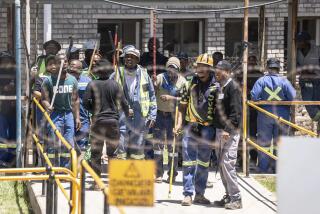Russian Miners Strike, Demanding Unpaid Wages
- Share via
MOSCOW — Hundreds of thousands of coal miners who haven’t been paid in months went on strike Tuesday, demanding that Russia’s Cabinet deliver their wages or resign.
The walkout, which shut at least 100 of Russia’s 287 coal mines, is the strongest protest in months against a cash shortage that is draining the economy in this sixth winter of painful post-Soviet reform.
It also marks an escalation of labor unrest into a political demand that could find broader support Thursday when the country’s largest federation of trade unions gathers in Moscow.
President Boris N. Yeltsin’s administration, which has muddled through previous waves of strikes without solving its chronic “nonpayment crisis,” appeared to be taking this challenge seriously.
Prime Minister Viktor S. Chernomyrdin called a Cabinet meeting for Thursday to discuss the strike, which his labor minister termed “dangerous from a social, economic and political standpoint.” Yeltsin indicated that he will send Chernomyrdin to Kuzbass, the most depressed coal region, this week.
In Russia’s free-market economy, only a small fraction of miners’ income is paid from the federal treasury. But the Independent Union of Coal Miners holds Chernomyrdin fully responsible for Russia’s cash crunch, which has crippled wide swaths of industrial Russia by rendering hundreds of companies unable to pay their employees or suppliers.
Private utilities, unable to collect from customers, cannot pay for the coal they use as fuel, so Rosugol, the giant coal monopoly, cannot pay the miners. Union leaders say 780,000 miners are owed $490 million in back wages--some from as far back as June.
While factory workers are often paid in the goods they produce so they can get by in a barter economy, the miners are not so lucky. Entire towns built around the mining industry have been paralyzed.
“We are sick and tired of going on hunger strikes and not getting any attention,” Ruben M. Badalov, the mine union’s deputy chairman, said in an interview. “A government that cannot resolve such problems should not exist. This time, let Chernomyrdin go on a hunger strike . . . until the miners are paid.”
Miners shook up the Soviet leadership with a 1989 strike and helped propel Yeltsin to the presidency two years later. This spring, when he was running for reelection, they struck again but quickly backed off when his emissaries promised to pay overdue wages.
“We trusted them, but then nothing happened,” Badalov said. “This time we will return to work only when our wages are paid in full.”
The union said 400,000 miners are on strike at 181 mines. But Rosugol said 100 mines are affected.
A prolonged strike could make the winter especially hard, because coal accounts for 80% of Russia’s heating fuel and more than half the fuel used by its electric power plants.
Badalov said the union had so far decided not to close mines that supply coal used to heat homes. But miners in Vladivostok, on the Pacific coast, stopped shipping coal Monday to local power plants in an effort to force them to pay overdue bills.
Russia’s cash crisis stems from sharp government curbs on the money supply, prescribed by the International Monetary Fund to wipe out inflation. The IMF compensates Russia monthly from a $10.2-billion credit package, but it cut off payments this fall after the government failed to meet tax collection targets.
Officials say tax collection improved sharply in October and November, clearing the way for renewed IMF lending.
More to Read
Sign up for Essential California
The most important California stories and recommendations in your inbox every morning.
You may occasionally receive promotional content from the Los Angeles Times.










